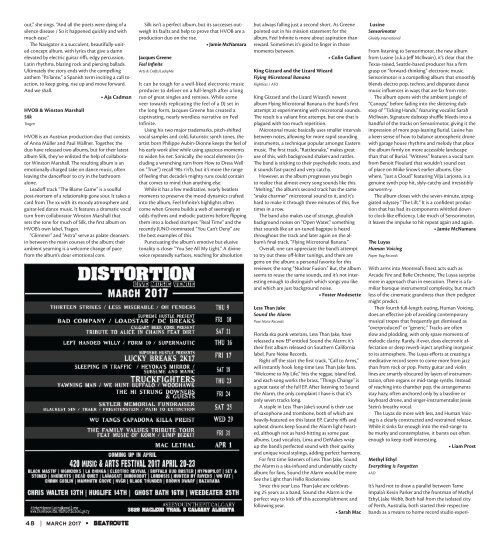BeatRoute Magazine AB print e-edition - March 2017
BeatRoute Magazine: Western Canada’s Indie Arts & Entertainment Monthly BeatRoute (AB) Mission PO 23045 Calgary, AB T2S 3A8 E. editor@beatroute.ca BeatRoute Magazine is a monthly arts and entertainment paper with a predominant focus on music – local, independent or otherwise. The paper started in June 2004 and continues to provide a healthy dose of perversity while exercising rock ‘n’ roll ethics. Currently BeatRoute’s AB edition is distributed in Calgary, Edmonton (by S*A*R*G*E), Banff and Canmore.
BeatRoute Magazine: Western Canada’s Indie Arts & Entertainment Monthly
BeatRoute (AB)
Mission PO 23045
Calgary, AB
T2S 3A8
E. editor@beatroute.ca
BeatRoute Magazine is a monthly arts and entertainment paper with a predominant focus on music – local, independent or otherwise. The paper started in June 2004 and continues to provide a healthy dose of perversity while exercising rock ‘n’ roll ethics.
Currently BeatRoute’s AB edition is distributed in Calgary, Edmonton (by S*A*R*G*E), Banff and Canmore.
Create successful ePaper yourself
Turn your PDF publications into a flip-book with our unique Google optimized e-Paper software.
out,” she sings. “And all the poets were dying of a<br />
silence disease / So it happened quickly and with<br />
much ease.”<br />
The Navigator is a succulent, beautifully-united<br />
concept album, with lyrics that give a damn<br />
elevated by electric guitar riffs, edgy percussion,<br />
Latin rhythms, blazing rock and piercing ballads.<br />
Ultimately the story ends with the compelling<br />
anthem “Pa’lante,” a Spanish term inciting a call to<br />
action, to keep going, rise up and move forward.<br />
And we shall.<br />
• Aja Cadman<br />
HVOB & Winston Marshall<br />
Silk<br />
Tragen<br />
HVOB is an Austrian production duo that consists<br />
of Anna Müller and Paul Wallner. Together, the<br />
duo have released two albums, but for their latest<br />
album Silk, they’ve enlisted the help of collaborator<br />
Winston Marshall. The resulting album is an<br />
emotionally charged take on dance music, often<br />
leaving the dancefloor to cry in the bathroom<br />
alone.<br />
Leadoff track “The Blame Game” is a soulful<br />
post-mortem of a relationship gone sour. It takes a<br />
card from The xx with its moody atmosphere and<br />
guitar-led dance music. It features a dramatic vocal<br />
turn from collaborator Winston Marshall that<br />
sets the tone for much of Silk, the first album on<br />
HVOB’s own label, Tragen.<br />
“Glimmer” and “Astra” serve as palate cleansers<br />
in between the main courses of the album; their<br />
ambient yearning is a welcome change of pace<br />
from the album’s dour emotional core.<br />
Silk isn’t a perfect album, but its successes outweigh<br />
its faults and help to prove that HVOB are a<br />
production duo on the rise.<br />
• Jamie McNamara<br />
Jacques Greene<br />
Feel Infinite<br />
Arts & Crafts/LuckyMe<br />
It can be tough for a well-liked electronic music<br />
producer to deliver on a full-length after a long<br />
run of great singles and remixes. While some<br />
veer towards replicating the feel of a DJ set in<br />
the long form, Jacques Greene has created a<br />
captivating, nearly wordless narrative on Feel<br />
Infinite.<br />
Using his two major trademarks, pitch-shifted<br />
vocal samples and cold, futuristic synth tones, the<br />
artist born Philippe Aubin-Dionne keeps the feel of<br />
his early work alive while using spacious moments<br />
to widen his net. Sonically, the vocal elements (including<br />
a wrenching turn from How to Dress Well<br />
on “True”) recall ‘90s r’n’b, but it’s more the range<br />
of feeling that decade’s mighty runs could contain<br />
that comes to mind than anything else.<br />
While it has a few meditative, nearly beatless<br />
moments to preserve the mood dynamics crafted<br />
into the album, Feel Infinite’s highlights often<br />
come when Greene builds a web of seemingly at<br />
odds rhythms and melodic patterns before flipping<br />
them into a locked stomper. “Real Time” and the<br />
recently JUNO-nominated “You Can’t Deny” are<br />
the best examples of this.<br />
Punctuating the album’s emotive but elusive<br />
tonality is closer “You See All My Light.” A divine<br />
voice repeatedly surfaces, reaching for absolution<br />
but always falling just a second short. As Greene<br />
pointed out in his mission statement for the<br />
album, Feel Infinite is more about aspiration than<br />
reward. Sometimes it’s good to linger in those<br />
moments between.<br />
• Colin Gallant<br />
King Gizzard and the Lizard Wizard<br />
Flying Microtonal Banana<br />
Flightless / ATO<br />
King Gizzard and the Lizard Wizard’s newest<br />
album Flying Microtonal Banana is the band’s first<br />
attempt at experimenting with microtonal sounds.<br />
The result is a valiant first attempt, but one that is<br />
plagued with too much repetition.<br />
Microtonal music basically uses smaller intervals<br />
between notes, allowing for more rapid sounding<br />
instruments, a technique popular amongst Eastern<br />
music. The first track, “Rattlesnake,” makes great<br />
use of this, with background shakers and rattles.<br />
The band is sticking to their psychedelic roots, and<br />
it sounds fast-paced and very catchy.<br />
However, as the album progresses you begin<br />
to realize that almost every song sounds like this.<br />
“Melting,” the album’s second track has the same<br />
“snake charmer” microtonal sound to it, and it’s<br />
hard to make it through three minutes of this, five<br />
times in a row.<br />
The band also makes use of strange, ghoulish<br />
background noises on “Open Water,” something<br />
that sounds like an un-tuned bagpipe is heard<br />
throughout the track and later again on the album’s<br />
final track, “Flying Microtonal Banana.”<br />
Overall, one can appreciate the band’s attempt<br />
to try out these off-kilter tunings, and there are<br />
gems on the album: a personal favorite for this<br />
reviewer, the song “Nuclear Fusion.” But, the album<br />
seems to reuse the same sounds, and it’s not interesting<br />
enough to distinguish which songs you like<br />
and which are just background noise.<br />
• Foster Modesette<br />
Less Than Jake<br />
Sound the Alarm<br />
Pure Noise Records<br />
Florida ska punk veterans, Less Than Jake, have<br />
released a new EP entitled Sound the Alarm; it’s<br />
their first album released on Southern California<br />
label, Pure Noise Records.<br />
Right off the start the first track, “Call to Arms,”<br />
will instantly hook long-time Less Than Jake fans.<br />
“Welcome to My Life,” hits the reggae, island feel,<br />
and each song works the brass. “Things Change” is<br />
a great taste of the full EP. After listening to Sound<br />
the Alarm, the only complaint I have is that it’s<br />
only seven tracks long.<br />
A staple in Less Than Jake’s sound is their use<br />
of saxophone and trombone, both of which are<br />
heavily-featured on this latest EP. Catchy riffs and<br />
upbeat drums keep Sound the Alarm light-hearted,<br />
although not as hard-hitting as some past<br />
albums. Lead vocalists, Lima and DeMakes wrap<br />
up the band’s perfected sound with their quirky<br />
and unique vocal stylings, adding perfect harmony.<br />
For first time listeners of Less Than Jake, Sound<br />
the Alarm is a ska-infused and undeniably catchy<br />
album; for fans, Sound the Alarm would be more<br />
See the Light than Hello Rocketview.<br />
Since this year Less Than Jake are celebrating<br />
25 years as a band, Sound the Alarm is the<br />
perfect way to kick off this accomplishment and<br />
following year.<br />
• Sarah Mac<br />
Lusine<br />
Sensorimotor<br />
Ghostly International<br />
From listening to Sensorimotor, the new album<br />
from Lusine (a.k.a Jeff Mcllwain), it’s clear that the<br />
Texas-raised, Seattle-based producer has a firm<br />
grasp on “forward-thinking” electronic music.<br />
Sensorimotor is a compelling album that smoothly<br />
blends electro pop, techno, and disparate dance<br />
music influences in ways that are far from rote.<br />
The album opens with the ambient jangle of<br />
“Canopy,” before fading into the skittering dubstep<br />
of “Ticking Hands,” fearuring vocalist Sarah<br />
Mcllwain. Signature dubstep shuffle bleeds into a<br />
handful of the tracks on Sensorimotor, giving it the<br />
impression of more pop-leaning Burial. Lusine has<br />
a keen sense of how to balance atmospheric drone<br />
with garage house rhythms and melody that place<br />
the album firmly on more accessible landscape<br />
than that of Burial. “Witness” features a vocal turn<br />
from Benoit Pioulard that wouldn’t sound out<br />
of place on Miike Snow’s earlier albums. Elsewhere,<br />
“Just a Cloud” featuring Vilja Larjosto, is a<br />
genuine synth pop hit, slyly-catchy and irresistibly<br />
earworm-y.<br />
The album closes with the seven-minute, arpeggiated<br />
odyssey “The Lift.” It is a confident production<br />
that has had its components whittled down<br />
to clock-like efficiency. Like much of Sensorimotor,<br />
it leaves the impulse to hit repeat again and again.<br />
• Jamie McNamara<br />
The Luyas<br />
Human Voicing<br />
Paper Bag Records<br />
With arms into Montreal’s finest acts such as<br />
Arcade Fire and Belle Orchestre, The Luyas surprise<br />
more in approach than in execution. There is a familiar<br />
baroque instrumental complexity, but much<br />
less of the cinematic grandness than their pedigree<br />
might predict.<br />
Their fourth full-length outing, Human Voicing,<br />
does an effective job of avoiding contemporary<br />
musical tropes that frequently get dismissed as<br />
“overproduced” or “generic.” Tracks are often<br />
slow and plodding, with only spare moments of<br />
melodic clarity. Rarely, if ever, does electronic affectation<br />
or deep reverb inject anything inorganic<br />
to its atmosphere. The Luyas efforts at creating a<br />
meditative record seem to come more from jazz<br />
than from rock or pop. Pretty guitar and violin<br />
lines are smartly obscured by layers of instrumentation,<br />
often organs or mid-range synths. Instead<br />
of reaching into chamber pop, the arrangements<br />
stay hazy, often anchored only by a bassline or<br />
keyboard drone, and singer-instrumentalist Jessie<br />
Stein’s breathy vocal.<br />
The Luyas do more with less, and Human Voicing<br />
is a clearly constructed and restrained release.<br />
While it sinks far enough into the mid-range to<br />
be murky and contemplative, it bursts out often<br />
enough to keep itself interesting.<br />
• Liam Prost<br />
Methyl Ethyl<br />
Everything is Forgotten<br />
4AD<br />
It’s hard not to draw a parallel between Tame<br />
Impala’s Kevin Parker and the frontman of Methyl<br />
Ethyl, Jake Webb. Both hail from the isolated city<br />
of Perth, Australia, both started their respective<br />
bands as a means to home record studio experi-<br />
48 | MARCH <strong>2017</strong> • BEATROUTE


















